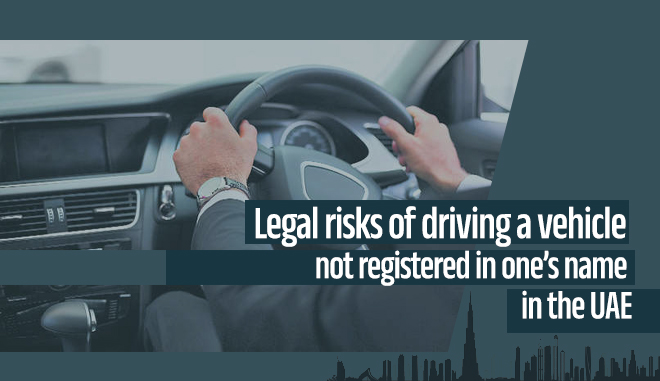Introduction
Driving a vehicle that is not registered in one’s name in the UAE leads to significant legal risks. This article outlines the relevant laws, penalties, and requirements for both residents and tourists to ensure compliance and avoid legal complications.
Legal risks of driving without permission
According to Article 447 of Federal Decree Law No. 31 of 2021, driving a car, motorcycle, or similar vehicle without the owner’s or authorized user’s consent can lead to severe penalties. These include imprisonment up to one year, a fine of up to Dh 10,000/- or both. It’s important to ensure that individuals should have clear permission from the vehicle’s registered owner before driving.
Driving a vehicle owned by family or others
If an individual is driving a car that belongs to his or her family member, like spouse or parents, they usually won’t face any issues. However, if the vehicle belongs to a friend or a distant relative, it’s better to get their permission first. Without the owner’s consent, the police have the authority to confiscate the vehicle under Article 60(3) of Federal Law No. 21 of 1995. To avoid any such problems, it is appropriate to get written permission from the owner so as to easily prove the right to drive the vehicle.
Must hold a valid license
Additionally, driving legally in the UAE requires holding a driving license that is recognized within the country. For residents, this means obtaining a UAE driving license. Under Article 51 of the Federal Law No. 21 of 1995, a person could be sentenced to three months of imprisonment or liable to a fine of at least AED 5000/- if it is found that he is driving without a valid driver’s license. The punishment is the same if the person is driving a vehicle on a license that does not permit him to drive that type of vehicle.
On the other hand, tourists can use an international driving license to drive in the UAE. However, there are specific provisions for visitors from certain countries. Nationals from all GCC nations, as well as countries like Australia, Austria, Belgium, Spain, Germany, France, Ireland, Netherlands, Italy, United Kingdom, Turkey, Greece, Switzerland, Norway, Denmark, Sweden, Romania, Poland, Finland, Portugal, Canada, United States, South Korea, Hong Kong, Singapore, Japan, New Zealand, and South Africa are permitted to drive using their home country’s license.
Insurance coverage for borrowed vehicles
When borrowing a car, understanding the insurance coverage is essential. Generally, if someone driving a borrowed vehicle, the owner’s insurance policy may cover, if certain conditions are met. Specifically, the driver should be over 25 years old and should hold his driving license for more than a year. If the driver is under 25 or had their driving licence for less than a year, an additional 10 per cent payment on the ‘excess amount’ is required. The excess amount is what a person pays when they are at fault in an accident.
For high-value or luxury vehicles, insurance policies often include special clauses. These might specify that only drivers over a certain age can drive the vehicle or that only named drivers covered by the policy are allowed to drive. These restrictions can particularly influence the insurance coverage in the event of an accident.
Renting a vehicle as a tourist
Tourists who hold a valid international driving license can rent and drive cars in the UAE. This includes vehicles registered either in their name or in the name of a close relative. It’s important for visitors to ensure they meet all requirements and understand the specifics of insurance coverage before driving or renting a car. Always verify the details of the driving regulations and insurance policies to avoid any legal or financial issues while driving in the UAE.
To avoid legal and financial issues, it is essential to adhere to UAE driving regulations, obtain necessary permissions, and ensure proper insurance coverage. Always verify driving regulations and insurance details to ensure compliance and safety.

